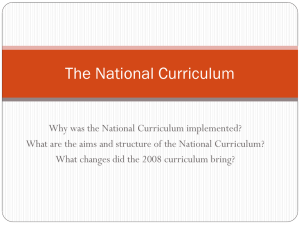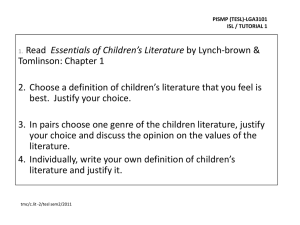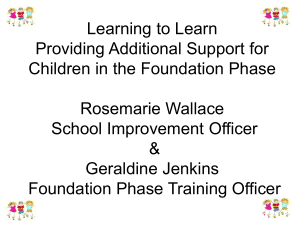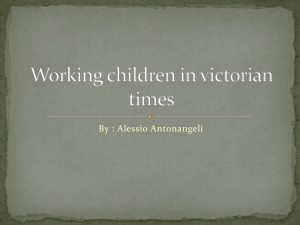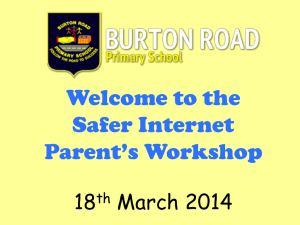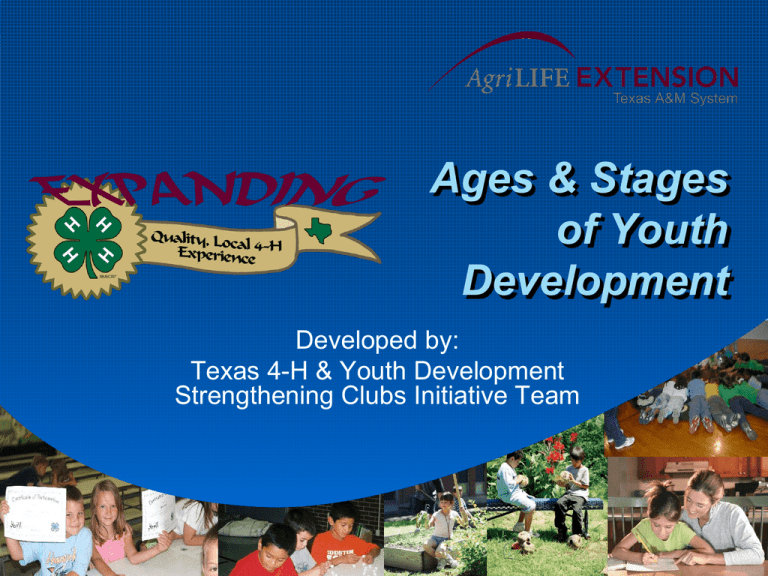
Ages & Stages
of Youth
Development
Developed by:
Texas 4-H & Youth Development
Strengthening Clubs Initiative Team
Topics
1. Characteristics of Development
2. The 6-8 Year Old
3. The 9-11 Year Old
4. The 12-14 Year Old
5. The 15-18 Year Old
6. Practical Implications for 4-H
Characteristics of Development
•
•
•
•
Physical
Social
Emotional
Intellectual
Who and/or what influences a
child’s growth and development?
•
•
•
•
•
Parents
Caregivers
Teachers
Peers
Extended Family
•
•
•
•
Community
Media
Heredity
Environment
Principles of Development
• Development is orderly, not random.
• Development is a continuous and gradual
process.
• Development is most rapid during the early
stages of infancy and the adolescent years.
• Not all children develop at the same pace.
• Not all children possess the same
temperament.
• Development occurs within a larger context.
• Development is a multi-faceted concept.
Puzzle Activity
What do you
think of when
we talk about
6-8 year olds?
Physical Characteristics of
6-8 Year Olds
• Growing slowly
• Learning to master physical skills
• Can control large muscles better
than small muscles
Implications:
• Messy with meals, arts/crafts
• Conduct activities that encourage
large muscle use
Social Characteristics of
6-8 Year Olds
• Learning how to be friends; may have
many friends
• Fighting occurs – doesn’t last long
• Boys begin to separate from girls
Implications:
• Small groups encourage social
interaction
• Role playing encourages empathy
• Mixed gender activities
Emotional Characteristics of
6-8 Year Olds
• Self-centered
• Seeking approval from adults
• Avoids punishment
• Sensitive to criticism; don’t like failure
Implications:
• Be positive!
• Plan activities that promote success
• Foster cooperation, not competition
Intellectual Characteristics of
6-8 Year Olds
• Concrete thinkers – base thinking in reality
• Can’t multi-task well
• More interested in doing things than the
end result
Implications:
• Plan short activities
• Focus on process, not final product
• Allow for exploration and inquiry
What do you
think of when
we talk about
9-11 year olds?
Physical Characteristics of
9-11 Year Olds
• Moving all the time—can’t sit still!
• Growth spurt – beginning adolescence
• Females mature before males
Implications:
• Provide active learning experiences
• Avoid competition between boys and
girls
Social Characteristics of
9-11 Year Olds
• Joining clubs; same sex groups
• Don’t understand view points of others, but
like to make others happy
• Like to please adults with successful project
completion
Implications:
• Use Group Learning with same sex
members
• Encourage older mentors to work with the
group
Emotional Characteristics of
9-11 Year Olds
•
•
•
•
•
Weak sense of individual identity
Moody!!!
Justice and equality become important
Need to feel part of something important
Begin to question authority but still want
guidance
Implications:
• Don’t compare youth to each other
• Help them identify their strengths
• Emphasize progress made from previous
performance
Intellectual Characteristics of
9-11 Year Olds
• Until 11, think concretely – black/white –
then begin to understand new ideas
• Learning to think abstractly
• More immersed in subjects that interest
them
• Want to find own solutions
Implications:
• Use simple, short directions and brief
learning experiences
• Offer a wide range of activities to ensure
success
What do you
think of when
we talk about
12-14 Year
Olds?
Physical Characteristics of
12-14 Year Olds
• Many physical changes
• Boys may still be growing; Boys
usually reach maximum height by 16,
girl by 14
Implications:
• Be willing to answer questions
• Avoid comments that criticize or
compare youth physically
Social Characteristics of
12-14 Year Olds
•
•
•
•
Looking for activities involving opposite sex
Look more to peers than parents
Searching for adult role models; fan clubs
Tend to reject solutions from adults in favor
of their own
Implications:
• Let them plan own programs
• Establish climate that is conducive to peer
support
• Emphasize personal development
Emotional Characteristics of
12-14 Year Olds
• Compare themselves to others
• See themselves as always on center stage/unsettled
emotions
• Want to be autonomous from parents/abandon
parental views
• Strive to earn independence, yet want and need
parents’ help
Implications:
• Let teens assume responsibility – expect them to
follow through
• Help them explore identity, values, beliefs
• Help them develop individual skills
• Encourage youth and adults working together
Intellectual Characteristics of
12-14 Year Olds
•
•
•
•
Gaining cognitive and study skills, abstract thinking
Ready for in-depth, long-term experiences
Like to set goals based on their needs
Moved from fantasy to realistic focus on their life’s
goals
Implications:
• Give them real-life problems to solve
• Let them make decisions and evaluate outcomes
• Encourage service learning
• Plan career exploration activities
What do you
think of when we
talk about
15-18
Year Olds?
Physical Characteristics of
15-18 Year Olds
• Concerned about body image
• Exhibit smaller range in size and maturity
among peers
• Tend to have realistic view of limits to which
body can be tested
Implications:
• Be willing to answer questions
• Avoid comments that criticize or compare
youth
• Set a good example for health and physical
fitness
Social Characteristics of
15-18 Year Olds
• Tend to romanticize sexuality but moving toward
better understanding of reality
• Search for intimacy; test sexual attractiveness
• Makes commitments and can follow through
• Desire respect; wants adult leadership roles
• Are apt to reject goals set by others
Implications:
• Let them plan own programs
• Establish climate that is conducive to peer support
• Emphasize personal development and leadership
Emotional Characteristics of
15-18 Year Olds
• Desire respect
• Accepting their own uniqueness but still seek approval
from peers
• Developing own set of values and beliefs
• Gaining autonomy; introspective
• Can initiate and carry out tasks without supervision
Implications:
• Let teens assume responsibility – expect them to follow
through
• Help them explore identity, values, beliefs
• Help them develop individual skills
• Encourage youth and adults working together
Intellectual Characteristics of
15-18 Year Olds
• Are mastering abstract thinking
• Can imagine impact of present behavior on
future
• Enjoy demonstrating acquired knowledge
• Will lose patience with meaningless activities
Implications:
• Give them real-life problems to solve
• Let them make decisions and evaluate
outcomes
• Encourage service learning
• Plan career exploration activities
Practical Implications
• For younger children:
– Understand that young children are limited by their
developmental capacities
– Organize activities & events that are ageappropriate
– Encourage active involvement rather than
competition
– Build upon children’s physical, social, emotional,
and cognitive skills
– Be generous with praise
– Encourage exploration
– Provide clear rules, boundaries, & structure
Practical Implications
• For adolescents/teens:
– Encourage emerging independence, but maintain
structure, boundaries, rules
– Be sensitive to self-image issues
– Be open to discussing/handling sensitive issues
– Foster positive peer interaction
– Be a positive role model
– Provide constructive criticism along with positive
feedback
– Promote hands-on activities & experiential
learning opportunities
"One hundred years from now, it will not matter
what my bank account was, how big my house
was, or what kind of car I drove. But the world
may be little better, because I was important in the
life of a child."
Forest Witcraft
The difference between 'involvement' and
'commitment' is like an eggs-and-ham breakfast:
the chicken was ‘involved’ – the pig was
‘committed.’

